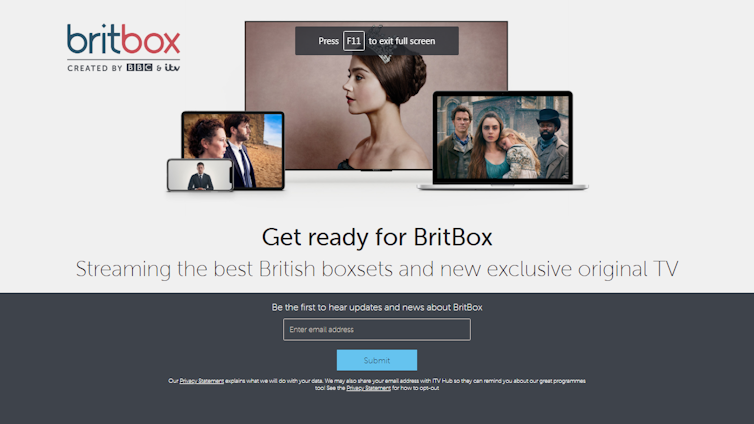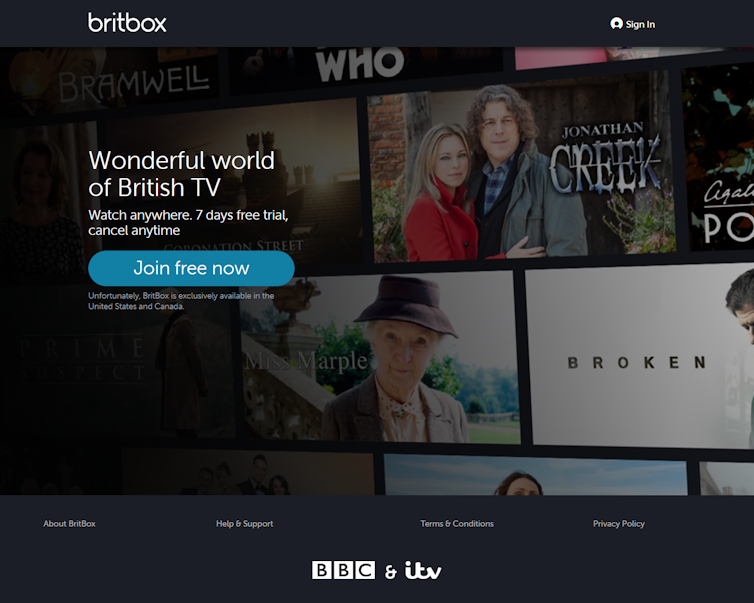The BBC and ITV recently announced a new joint venture to create a streaming service that they have called “Britbox”. The focus for Britbox will be to sell British television programmes, old and new, to the UK public, for a subscription of around £5 per month.
BBC director-general, Tony Hall said: “Research with the British public shows that there is a real appetite for a new British streaming service – in addition to their current subscriptions.” ITV boss Carolyn McCall said 43% of British homes with internet connections had indicated they were interested in receiving the service.
Britbox already exists in North America with 500,000 subscribers and the channels’ already have UK streaming platforms iPlayer and ITV Hub. And last year, BBC Worldwide – the international licensing arm – merged with BBC Studios, the production arm. Joining these two branches already paves the way for a more cohesive strategy that aligns licensing and streaming established content with producing new shows for TV and online audiences.
But the road will not be easy – streaming is a tough market and there are many challenges ahead. Can these traditional broadcasters take on Netflix on its own territory?

Britbox UK screenshot. Britbox
Netflix is a major global player and has overtaken BBC iPlayer as the UK frontrunner when it comes to streaming. It is not just hugely successful in terms of viewers and revenue, but has become a cultural staple – after all, it’s “Netflix and chill” not “the Beeb and chill”. The breadth of existing and new content on Netflix is impressive. But the BBC and ITV could hold a reasonable amount of power here. There have already been problems for Netflix caused by Disney reviewing its licensing agreement – which includes not just children’s animations but also the Marvel and Star Wars franchises – to prepare for its own streaming platform. By removing classic and recent UK shows from Netflix, Britbox could mount a decent challenge.
But times are changing. A recent Netflix letter to shareholders stated that its biggest competition is not HBO or other US-based streaming services but the online game Fortnite. The huge popularity of gaming – not just for playing but also in-game live events and watching other people play on live streaming platforms such as Twitch or Youtube – means that even Netflix is moving on from simple streaming.
We are seeing the beginning of a new rise in interactive films such as Black Mirror: Bandersnatch and the various choose-your-own-adventures in children’s content on Netflix (Puss in Boots, for example). Is a British platform simply too late to the game? Britbox will have to think hard about what format its content will be in and how it can innovate the traditional viewing experience. It may not be enough to just put the back catalogue online.
Potential for success?
The 500,000 subscribers in North America are already enjoying British sci-fi and fantasy such as classic Doctor Who, Red Dwarf and Merlin, as well as comedy staples such as Fawlty Towers, The Young Ones, Absolutely Fabulous and Blackadder. Crime shows such as Inspector Morse, Prime Suspect and Dalziel and Pascoe are also very popular. There are a few unique selling points of British television that could make Britbox particularly successful at home and abroad:

Britbox US and Canada screenshot. Britbox
Period drama – British period shows and actors already enjoy worldwide popularity and the likes of Victoria (ITV) and Peaky Blinders (BBC) are currently licensed to Netflix, while the BBC’s 1995 version of Pride and Prejudice with Jennifer Ehle and Colin Firth is already on Britbox. Documentaries – not just David Attenborough’s extensive back catalogue but the large number of quality BBC documentaries on everything from ancient civilisations to Silicon Valley are a resource that will continue to be of repeat interest to old and new viewers alike.
There’s so much good stuff in the BBC and ITV archives – rather than collecting all the different box sets, how convenient would it be to have all your retro viewing on one platform for a few pounds a month?
Home and away
British content for British audiences – the particular quirks that define UK TV are also massively popular worldwide. While shows such as The Office and Being Human have been remade for US audiences, the originals often maintain a cult following in English-speaking countries. It seems obvious that Britbox will expand beyond the UK eventually – but it may be more successful if it remains focused on aiming new content at the British market, making new shows that appeal to international viewers exactly because of the unique style of UK television as a selling point.
Another selling point is language: television shows are a good way to learn a new tongue and many people want to learn British English as opposed to the American version they see in Hollywood blockbusters. Making UK television more accessible would help promote language learning all over the world.
If Britbox is to succeed, it needs to balance the need to adapt to online viewing habits with making the most of classic and new British content. The BBC and ITV will also need to negotiate the balance between Britbox and their individual streaming services (iPlayer and ITV Hub), which may impact on the future of television licensing within the UK. There is potentially a streaming goldmine here, but only if Britbox can find their niche against the backdrop of Netflix domination.



 Netflix Shuts Down Boss Fight Entertainment, Developer of “Squid Game: Unleashed” Amid Gaming Strategy Shift
Netflix Shuts Down Boss Fight Entertainment, Developer of “Squid Game: Unleashed” Amid Gaming Strategy Shift  Trump to Pardon Reality Stars Todd and Julie Chrisley After Tax Fraud Conviction
Trump to Pardon Reality Stars Todd and Julie Chrisley After Tax Fraud Conviction  Google and NBCUniversal Strike Multi-Year Deal to Keep NBC Shows on YouTube TV
Google and NBCUniversal Strike Multi-Year Deal to Keep NBC Shows on YouTube TV  Paramount Skydance Eyes Streamlined Merger with Warner Bros Discovery Amid $60 Billion Offer Rejection
Paramount Skydance Eyes Streamlined Merger with Warner Bros Discovery Amid $60 Billion Offer Rejection  BTC Flat at $89,300 Despite $1.02B ETF Exodus — Buy the Dip Toward $107K?
BTC Flat at $89,300 Despite $1.02B ETF Exodus — Buy the Dip Toward $107K?  FCC Chair Brendan Carr to Testify Before Senate Commerce Committee Amid Disney-ABC Controversy
FCC Chair Brendan Carr to Testify Before Senate Commerce Committee Amid Disney-ABC Controversy  6 simple questions to tell if a ‘finfluencer’ is more flash than cash
6 simple questions to tell if a ‘finfluencer’ is more flash than cash  The Mona Lisa is a vampire
The Mona Lisa is a vampire  Trump–Kushner Links Raise Concerns as Paramount Pushes $108B Warner Bros Discovery Bid
Trump–Kushner Links Raise Concerns as Paramount Pushes $108B Warner Bros Discovery Bid  Trump Proposes Two-Year Shutdown of Kennedy Center Amid Ongoing Turmoil
Trump Proposes Two-Year Shutdown of Kennedy Center Amid Ongoing Turmoil 































